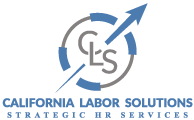California’s final pay regulations are incredibly strict, and even a single day’s delay in presenting the last paycheck to a terminated or resigning employee can result in a penalty. Explore how the laws impact you and how to avoid costly fines.
Imagine a manager at your company is about to terminate an employee. Do they know when the employee’s final paycheck is due? Do you? For California businesses, the answer is probably: right now!
California’s final pay regulations are very strict and very specific – detailing how and when terminated or resigning employees must be paid all earned and outstanding wages, including accumulated vacation time (Labor Code § 201-208 and 227.3).
CA Final Pay Regulations 101: When is the Final Paycheck Due?
The state’s final pay regulations are incredibly detailed and explore many specific circumstances. However, here are the three most relevant highlights for most businesses:
- Terminated Employees – The final paycheck is due immediately at the time and place of the discharge.
- Resigning Employees (who give 72+ hours of notice) – The final paycheck is due at the end of the final shift and must be paid at the office or agency of the employer in the county where the employee worked.
- Resigning Employees (who quit with less than 72 hours of notice) – The final paycheck is due within 72 hours of the employer receiving notice of the employee’s intention to quit. The employee may choose to have the final paycheck mailed to a designated address; in which case the mailing date serves as the date of payment.
There are variations in the final pay regulations for specific workers in certain industries – including the motion picture industry, some agricultural sectors, oil drilling, and event venues – so it’s important to understand if your business falls within any of these special circumstances. More detailed information about these exceptions can be found on the State of California’s Department of Industrial Relations website.
The Waiting Time Penalty: What Are the Consequences of Non-Compliance?
Employees who aren’t paid their final paycheck according to the state’s final pay regulations are eligible for waiting time penalties – or continuing wages designed to penalize the offending company. Waiting time penalties are calculated by multiplying the employee’s daily wage rate by the number of days in which the final pay has been overdue (up to 30 days).
Best Practices: How to Ensure Compliance (and Avoid Fines)?
It’s important to have expert HR guidance when it comes to all employee-related issues, including hiring, firing, and disciplining employees. These best practices can help you start thinking proactively about your HR processes and risk exposures.
- Understand which final pay regulations are relevant to your business and stay up-to-date on changes. This may mean working with an HR Outsourcing Firm that will keep you informed.
- Develop clear policies and procedures for terminations and resignations (as well as all other employee-related actions).
- Train all managers and supervisors on the company’s policies and procedures – including immediately alerting your HR representative of an employee’s resignation notice (remember, that’s when the clock starts ticking) and involving HR in all termination plans before the termination takes place.
- If circumstances arise that make it impossible to adhere to the final pay regulations, be proactive by including the waiting time penalties directly in the final paycheck.
Minimize Your Employee-Related Risk Exposures with Expert HR Guidance
Trusted in the community since 2007, CaliforniaLabor Solutions LLC (CLS) is a specialized HR consulting firm – based out of Orange County, California – that offers comprehensive, personalized, and scalable outsourcing services designed to grow with your evolving needs.
As Founder and CEO of CLS, Shawn Larry takes a solutions-driven approach to human resources – working to inspire confidence in the CEOs and managers who depend on his leadership. In addition to 20+years of experience in the field, Shawn has achieved many credentials and recognitions, including a J.D. from UOP-McGeorge Law School; California Private Investigator License; Certified Mediator; Senior Professional in Human Resources Certification (by HR Certification Institute); and Senior Certified HR Professional (by International Public Management Association).

